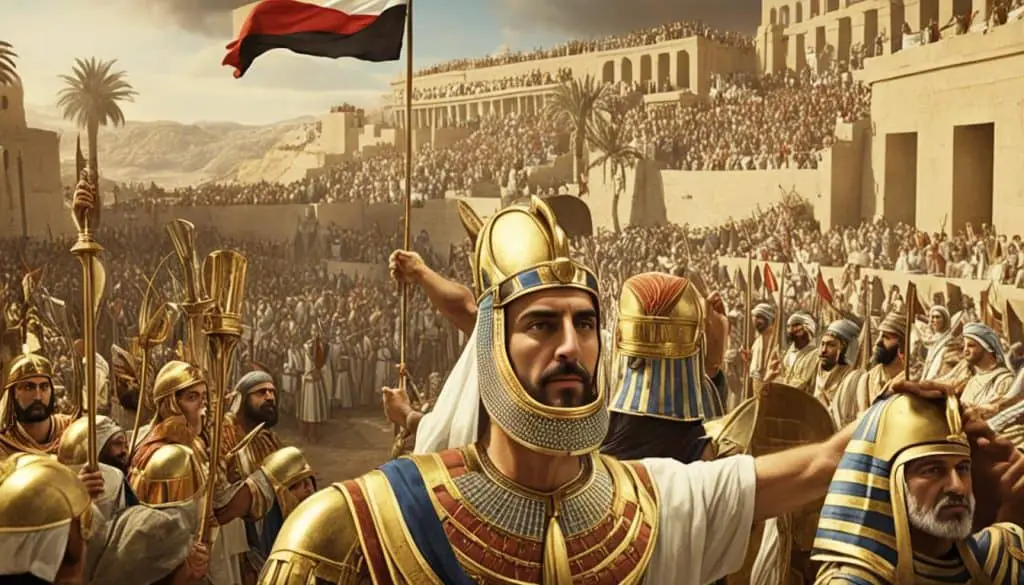Table of Contents
Have you ever thought of the Bible as a history book? Indeed, it is filled with stories of diplomatic ties between Israel and foreign lands. These accounts highlight the importance of strategic alliances in shaping the past, offering a glimpse into ancient diplomacy.
Take, for example, Jehoshaphat’s pact with Ahab, and David’s truce with the Philistines. These tales are rich in political intrigue, exposing the challenges of maintaining diplomacy during times of war and peace.
This text will explore eight key alliances from the Bible. We’ll look at the partnership between Solomon and Hiram, Jehoshaphat’s agreement with Ahab, and Gideon’s declined offer. Each account shows the impact of these alliances on history and their relevance to modern diplomatic understanding.
Ready to journey into the secrets of biblical diplomacy? Let’s begin!
Solomon and Hiram: A Cedarwood Alliance (Kings 1:51-53)
King Solomon was a wise ruler of Israel. He knew building a magnificent temple in Jerusalem was key. For this, he joined forces with King Hiram of Tyre. Hiram was a well-known trader and a supporter of temple construction. This partnership helped them get the important materials, like cedar and cypress wood, for the temple.
Hiram had a lot of timber. He agreed to provide the temple’s needed cedar and cypress wood. Also, he sent skilled workers from Tyre to help build the temple. In return, Solomon promised to give Hiram grain and olive oil from the rich fields of Israel.
“The Lord has said that he would dwell in thick darkness. I have indeed built you an exalted house, a place for you to dwell in forever.” – Kings 1:51-53
The teamwork of Solomon and Hiram is a great example of how sharing resources between kingdoms can work. Solomon’s wisdom, combined with Hiram’s resources, made a powerful team. This partnership not only led to the temple’s successful building. It also built trust and brought prosperity to both their lands.
Below is a picture of the temple’s grand building. It was made possible through the cedar and cypress wood from their alliance.
Jehoshaphat and Ahab: A Strategic Partnership (Kings 1:22)
Kings Jehoshaphat of Judah and Ahab of Israel joined forces against the Arameans. Their goal was to make their lands safer by working together. This alliance helped them become stronger against a shared threat.
Jehoshaphat knew that working with other kingdoms made sense. As the Arameans became a bigger danger, it was clear they needed each other. He saw that unity and sharing resources was the key to survival.
“Working together makes us stronger against enemies,” King Jehoshaphat wisely noted when the alliance started.
Jehoshaphat and Ahab brought their armies together to face the Arameans. They didn’t just focus on military plans. Both kings also worked on being friends and helping each other with resources.
But even with their best planning and efforts, they couldn’t beat the Arameans. In the end, the Arameans won, showing the challenge they faced.
“Though we did not win, this alliance shows how vital it is to work together against threats,” Jehoshaphat said after the defeat.
The partnership between Jehoshaphat and Ahab shows the tricky world of political friendships long ago. It highlights the risks and benefits leaders weighed to keep their kingdoms safe.
| Key Takeaways |
|---|
| 1. Strategic partnerships can strengthen kingdoms’ defense against common enemies. |
| 2. Cooperation between kingdoms requires diplomatic ties and resource sharing. |
| 3. The success of alliances depends on the nature of the enemy and the strategies employed. |
| 4. Despite defeat, alliances contribute to the understanding of ancient political dynamics. |
Even though Jehoshaphat and Ahab didn’t win, their story highlights an important aspect of working together. It shows how kingdoms handle threats. The wisdom from their story remains, emphasizing smart choices and working together in hard times.

Hezekiah and Egypt: Trust in God (Isaiah 30:1-7)
King Hezekiah thought about teaming up with Egypt against Assyria. He wanted their military help. But, Prophet Isaiah warned him against this. Isaiah said trusting in God is better than trusting in other countries. He urged them to rely on God’s help.
Isaiah’s warning is still relevant today. It shows that while friends are helpful, we should trust God the most. Hezekiah’s dilemma highlights the hard choices leaders face in tough times.
“Woe to the obstinate children,” declares the Lord, “to those who carry out plans that are not mine, forming an alliance, but not by my Spirit, heaping sin upon sin…”
– Isaiah 30:1
The Risks of Trusting in Earthly Strength
Hezekiah’s plan to ally with Egypt shows the danger of trusting human power. Isaiah warned about relying just on our plans. He said it’s crucial to align with God’s will.
Putting our faith in worldly alliances can backfire. Egypt looked strong then but was not dependable. Only God can truly protect us.
Choosing Trust in God Over Trust in Man
Isaiah advised Hezekiah to trust in God, not Egypt. He wanted Judah to rely on God’s wisdom and might. By doing so, he encouraged them to walk in faith.
Comparing Trust in God and Trust in Earthly Alliance
| Trust in God | Trust in Earthly Alliance |
|---|---|
| Reliance on divine guidance and provision | Reliance on the strength and resources of a foreign nation |
| Assurance of God’s faithfulness | Uncertainty of human alliances and shifting political dynamics |
| Confidence in God’s deliverance | Dependence on the capabilities and intentions of a foreign power |
Choosing God over the world in hard times takes faith and wisdom. It means admitting we don’t know it all. Hezekiah’s story teaches us that God is our best security.
Rehoboam and Shishak: A Desperate Plea (1 Kings 14:25-26)
After the kingdom split, Rehoboam was at risk from Jeroboam of Israel. He sought defense from Egypt, led by Pharaoh Shishak. This was a last resort to protect his land.
Taking help from Egypt showed the difficult political situations of that time. Rehoboam’s power was weaker after the split, making him an easy target. He saw Egypt as a strong military ally.
“Egypt, a land of ancient power, became an unexpected refuge for Rehoboam. His alliance with Pharaoh Shishak provided a glimpse into the delicate balance of power in the region. But little did Rehoboam know that this plea for help would come at a great cost.”
Egypt did help, but they didn’t only protect Jerusalem. They also took its treasures during the battle, betraying Rehoboam’s trust.
As the Bible recounts:
“In the fifth year of King Rehoboam, Shishak king of Egypt came up against Jerusalem. He took away the treasures of the house of the LORD and the treasures of the king’s house. He took away everything. He also took away all the shields of gold that Solomon had made.”
The aftermath showed how complex alliances can be. What started as a call for defense ended with an ally turning foe.
Rehoboam’s experience warns us about the challenges of power and alliances. It reminds us to think carefully before making agreements with others.

Despite the negative results, Rehoboam’s action reflects leaders’ drive to protect their people, even at great costs.
Esther and Ahasuerus: Diplomacy in the Persian Court (Book of Esther)
In the Book of Esther, we follow the story of Queen Esther. She was Jewish and married to Ahasuerus, the Persian king. Esther saved her people from a plan to kill them, led by Haman.
Esther, as queen in Persia, had a lot of power. She used her high position to protect the Jews. She worked cleverly with the king and others, using diplomacy to stop the danger.
“For if you remain silent at this time, relief and deliverance for the Jews will arise from another place, but you and your father’s family will perish. And who knows but that you have come to your royal position for such a time as this?” – Mordecai to Esther (Esther 4:14)
Esther was able to convince the king to save her people. She showed him that Haman wanted to hurt the Jews. Her wise words and smart plan saved many lives.
Their story shows how courage and clever strategy can achieve big things in politics. Esther’s bravery and intelligence protected the Jews in a foreign land.

The Key Elements of Esther’s Diplomatic Success:
- Assertive Communication: Esther was bold in talking to Ahasuerus. She told the king about Haman’s evil plan.
- Strategic Timing: Esther picked the right moment to tell the king the truth about Haman. This helped change the king’s mind in her favor.
- Emotional Intelligence: Esther understood how to handle relationships at the court. She could make friends and get support when needed.
The Legacy of Esther’s Diplomacy:
Esther’s smart diplomacy not only saved her people. It also influenced Jewish history and culture greatly. The Purim festival celebrates Esther’s victory, reminding people of the power of courage and smart strategy in hard times.
| Esther’s Diplomatic Strategies | Impact |
|---|---|
| Persuasive communication with Ahasuerus | Revoked decree to exterminate Jews, ensuring their safety |
| Exposed Haman’s evil intentions | Prevented a genocide and brought justice to the perpetrators |
| Formed alliances within the Persian court | Galvanized support for the Jewish people, leading to their protection |
Esther’s skills in diplomacy are an example for us all. She shows how smart plans and influence can change the course of history, even in the toughest situations.
David and the Philistines: A Temporary Alliance (1 Samuel 27:1-12)
David was running from King Saul, who chased him constantly. He found safety in Gath, a Philistine city, with King Achish. This led to a rare situation where David, the future Israelite king, and the Philistines, old enemies, formed a temporary alliance.
Being in this alliance let David escape Saul and find a safe haven. Gath’s strong army made it a good place for David to regroup.
But, this deal made David face tough moral dilemmas. As someone pledged to Israel, he shouldn’t be with its foes. This decision went against his known loyalty to Israel and what he believed was his God-given mission.
“Then Achish would say, ‘Where did you make a raid today?’ And David would say, ‘Against the Negev of Judah’ or ‘Against the Negev of the Jerahmeelites’ or ‘Against the Negev of the Kenites.'”
1 Samuel 27:10
David used trickery to handle his situation with King Achish. He made Achish think he attacked others, not Israelites. This way, David stayed true to Israel while keeping safe in enemy land.
The more David stayed with the Philistines, the more he risked alienating himself from his people and his divine calling.
Even with the moral issues, David learned valuable skills and leadership in Gath. This laid the groundwork for his successful rule as Israel’s king.
The story of David and the Philistines shows us about temporary alliances and making hard choices. David’s story teaches us about the fine balance between doing what it takes to survive and staying true to one’s values and purpose.

| Alliance | Description |
|---|---|
| Parties Involved | David, King Achish of Gath |
| Purpose | Provide temporary safe haven for David |
| Moral Dilemmas | Aligning with traditional enemies, deception |
| Consequences | Potential alienation from own people |
Gideon and Midianite Kings: A Rejected Proposal (Judges 7:15-22)
After beating the Midianites, Gideon thought about making peace with their kings, Zebah and Zalmunna. He wanted to use this victory to change who was in power in the region. Unfortunately, the Israelites said no to Gideon’s plan. They wanted to hold onto their own way of life.
“The Israelites turned down Gideon’s idea, choosing to keep their culture and freedom intact.”
The Israelites saying no showed how much they valued their identity. This was mainly about staying true to their faith and traditions. They knew saying yes could pull them away from what they believed in.
Keeping their national identity was very important. It was based on their shared past, the things they did, and their faith. This made them know who they were and kept them different from other nations.
Refusing the alliance also shows the Israelites’ strong will. They were sure about their goals and what they were supposed to do. It was a clear sign of their strong belief in God’s plan for them.
The Importance of National Identity
This event was just one example of how the Israelites protected their way of life. Many times, they chose to keep their customs and religion safe from outside actions.
National identity helps bring people together. It makes them feel like they belong and helps keep their culture alive. For the Israelites, it was their strength and shield against tough times.
A Symbol of Unity and Faith
Gideon’s choice not to make peace stood for the Israelites’ unity and strong faith. Turning down the offer sent a big message to others. It showed their firm values and belief that God had a special plan for them.
Preserving national identity has always been key in nation building. It gives a group a reason to be together and helps them face tough times. It also lets them celebrate who they are in history.

| Gideon and Midianite Kings: A Rejected Proposal | |
|---|---|
| Key Players | Gideon, Zebah, Zalmunna |
| Alliance Proposal | Forming an alliance between the Israelites and the captured Midianite kings |
| Rejection | The Israelites emphasize the importance of national identity and decline the proposal |
| Significance | Highlights the determination of the Israelites to preserve their unique heritage and values |
Asa and Damascus: Treasures for Assistance (1 Kings 15:18-22)
King Asa of Judah faced an attack by Israel’s Baasha. To defend, he made a deal with Damascus’ Ben-hadad. Asa traded treasures from the temple for aid, showing how alliances can bring strategic advantage.
Facing a serious threat from Baasha, King Asa found a diplomatic solution. He joined forces with Ben-hadad of Damascus. Asa used treasures from the Jerusalem temple as a negotiation tool. He believed forming alliances can be key in tough times.
The items from the temple were more than just riches. They symbolized deep faith and represented wealth. Asa saw the benefit of using these treasures to get support from Damascus.
Through his agreement with Ben-hadad, Asa proved the power of offering valued assets for allegiances. By giving temple treasures, Asa showed his dedication to the partnership. He was ready to make sacrifices for his people’s safety.
Giving up these treasures showed the seriousness of the situation. Asa focused on protecting his kingdom at all costs. This partnership highlights how leaders might sacrifice to keep their nations safe.
Asa’s experience with Damascus enlightens us about diplomacy’s intricacies and the value of alliances in hard times. It teaches the strategic use of available resources to gain international help. Asa’s sacrifices underline that alliances, despite challenges, can bolster a nation’s defense.
The Bargain for Assistance
Asa used the Jerusalem temple’s treasures to secure military help, showing how smart diplomacy can protect a nation. This trade was to ensure the security of his people and his kingdom’s survival.
| Key Elements | Details |
|---|---|
| Alliance | Asa sought an alliance with Ben-hadad, the ruler of Damascus. |
| Treasures | Asa offered treasures from the Jerusalem temple as a valuable payment. |
| Assistance | Asa hoped to obtain military support to defend against the attack from Baasha of Israel. |

Key Moments Shaping Ancient History
Ancient history is marked by key moments that changed the world’s path. Diplomatic alliances, in particular, have shaped political, social, and economic outcomes. They brought countries together, at times causing cooperation and at times conflict.
The Bible shows us many examples of such alliances. They influenced the fate of nations through history.
One memorable example is the alliance between King Solomon of Israel and King Hiram of Tyre. Solomon asked Hiram for wood to build the temple in Jerusalem. This partnership advanced trade between their lands.
Another vital alliance was between King Jehoshaphat of Judah and King Ahab of Israel. They united against the Arameans. This event underlines working together against common foes and the challenges in political relations.
In times of turmoil, alliances tested leaders on moral choices, strategic moves, and impacts on faith and identity.
A fascinating alliance was King Asa of Judah’s with Ben-hadad of Damascus against an attack. Asa used temple treasures to secure military help. This act shows the shrewdness needed in alliances.
Challenges and repercussions marked these alliances. For instance, David siding with the Philistines for protection raised moral concerns. Leaders often faced tough decisions, as shown in this alliance.
To grasp ancient history, one must study these significant events and their alliances. They show the intricate political, strategic, and moral issues leaders tackled in the past.

Ancient Alliances – A Comparative Overview
| Alliance | Key Players | Purpose | Outcome |
|---|---|---|---|
| Solomon and Hiram | King Solomon of Israel, King Hiram of Tyre | Obtain cedar and cypress wood for temple construction | Successful completion of the temple and strengthened trade relations |
| Jehoshaphat and Ahab | King Jehoshaphat of Judah, King Ahab of Israel | Defend against the Arameans | Unsuccessful, but highlighted the importance of strategic alliances |
| Hezekiah and Egypt | King Hezekiah of Judah, Egypt | Counter the threat of Assyria | Prophet Isaiah warned against the alliance, emphasizing trust in God |
| Rehoboam and Shishak | King Rehoboam of Judah, Pharaoh Shishak of Egypt | Defend against Jeroboam of Israel | Egyptian assistance obtained but resulted in the plundering of Jerusalem |
| Esther and Ahasuerus | Queen Esther, King Ahasuerus of Persia | Prevent the genocide of the Jewish people | Successful intervention and salvation of the Jewish people |
| David and the Philistines | King David of Israel, King Achish of Gath | Seeking a safe haven | Provided a temporary refuge but posed moral and ethical dilemmas |
| Gideon and Midianite Kings | Gideon, Midianite kings Zebah and Zalmunna | Explore a potential alliance | Alliance rejected, emphasizing the importance of national identity |
| Asa and Damascus | King Asa of Judah, Ben-hadad of Damascus | Defend against an attack from Baasha of Israel | Alliance formed, showcasing strategic bargaining power |
Biblical alliances are pivotal in ancient history’s shaping. Leaders’ political, moral, and strategic choices during these moments profoundly influenced the world.
Conclusion
The Bible shows us how important international friendships were in ancient times. These stories about Israel’s kings and queens working with other nations are fascinating. They highlight the careful thought that went into making friends across boundaries.
Leaders like King Solomon and Queen Esther made deals to help their countries. They showed us how faith and politics mixed. It wasn’t easy, as choosing when to ally with a nation and when not to was a big decision.
This ancient wisdom is not just about history. It gives us clues on how to work with other countries today. The lessons in these stories are still relevant. They remind us that diplomacy has always been part of international relations.




